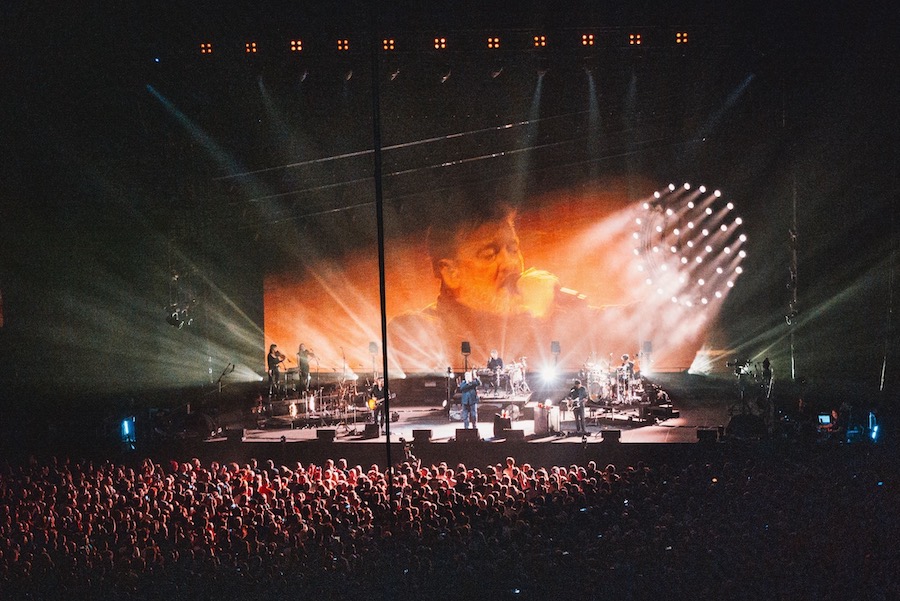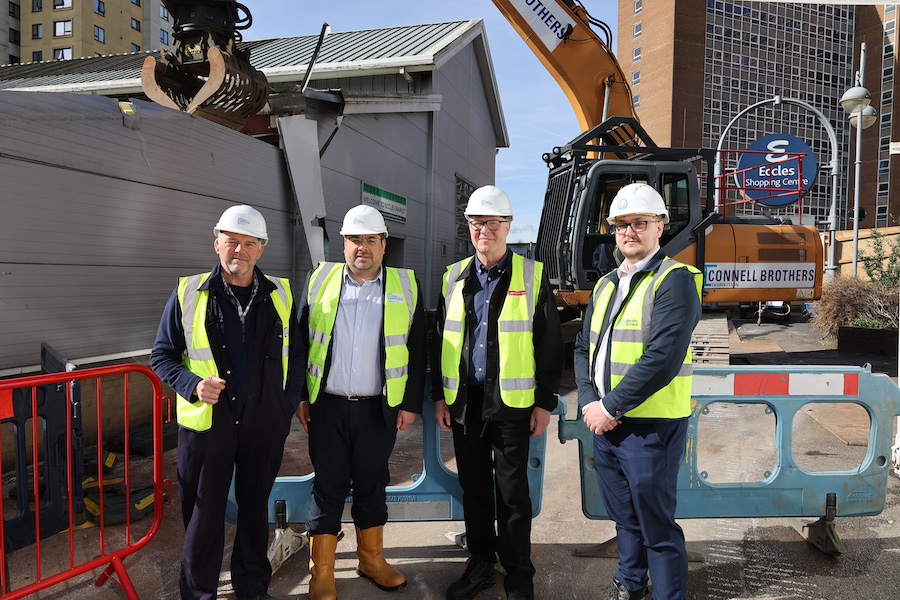Looking back on the rise and fall of Salford’s Rialto complex
- Written by Thom Bamford
- Last updated 5 months ago
- City of Salford, Featured, History
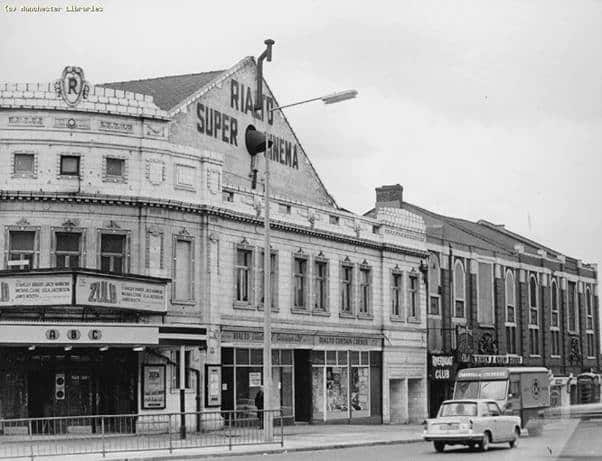
The Rialto was once a grand icon of North Manchester and Salford, standing at the corner of Bury New Road and Great Cheetham Street West.
Its magnificent art deco architecture, with an off-white tiled facade and red terra cotta cherubs carved above its doors, gave the building a stately presence.
Built in the Italian style of the famous Rialto district in Venice, from which it borrowed its name, the structure was more than just a cinema—it was a bustling entertainment hub for decades.
Yet today, its has gone – replaced by (of all things) a McDonalds.
The Birth of the Rialto
The New Rialto Cinema opened its doors on 7th November 1927, a grand addition to Salford’s burgeoning entertainment scene.
It was a landmark in itself—Cinema Treasures described it as “a 1,400-seat cinema (with all seating on a single floor), nine shops, a billiard hall and a dance hall”—one of the city’s first entertainment complexes.
Soon after opening, the Rialto was taken over by the ABC chain in 1931, and renamed the Rialto Super Cinema.
For decades, it was the place where Salfordians came to be enchanted by the magic of the movies.
Mike Leigh, the famed filmmaker, who grew up in the area, later reflected on how the cinema shaped his career.
“This was my alma mater,” Leigh said when he received the Freedom of Salford in 2019, “Here I savoured and cherished and was inspired by all manner of movies… I would sit in the dark and think ‘Wouldn’t it be great if you could have a film where actors were like real people.’”
But by 1973, the golden age of cinema was in decline, and the doors of the Rialto shut. Yet, this was only the beginning of its second life.
From bingo halls to Disco Balls: The Rialto Transforms
After closing as a cinema, the Rialto became a bingo hall, under the names Alpha Bingo Club and later Coral Bingo Club, staying in operation until 1999. In its later years, a number of other ventures filled the Rialto’s spaces—perhaps none more memorable (or infamous) than the slew of nightclubs that occupied the building.
In the early 1960s, the Broughton Assembly Rooms, part of the Rialto complex, hosted the Disc A Go-Go Club, a clubbing hotspot that captured the pulse of the era’s emerging youth culture.
By the mid-60s, it transformed into the Whisky A Go-Go, where the now infamous Jimmy Savile was the resident DJ, spinning records while the club’s patrons danced under disco lights.
Alongside Savile was Dave Lee Travis, another famous DJ of the era. The clubs drew in local celebrities, including George Best, who regularly frequented the snooker hall.
A host of performers also graced the Rialto’s stages.
Elkie Brooks, a Salford-born singer, got her big break here at just 15, working at the Whisky A Go-Go, where she beat out fifty other girls for a residency.
While her career soon led her to London and beyond, Brooks remained one of the many performers whose careers took flight at the Rialto.
Joy Division and New Order
By the late 1970s, the Rialto had cemented itself as a cornerstone of Salford’s music scene.
While disco may have ruled the dance-floors, it was the venue’s rehearsal rooms that incubated some of Manchester’s most influential bands.
Joy Division, the iconic post-punk band, and A Certain Ratio—pioneers of Manchester’s experimental funk scene—both found a home at the Rialto.
In 1980, just before the untimely death of Joy Division’s frontman Ian Curtis, the band rehearsed at Pinky’s, a nightclub in the Rialto complex.
It was here they wrote two of their last tracks, the haunting Ceremony and In a Lonely Place—songs that would later mark the transition from Joy Division to New Order, one of Manchester’s most celebrated bands.
Bassist Peter Hook recalled in his autobiography how Joy Division’s surviving members returned to Pinky’s soon after Curtis’ death to continue playing and writing music.
It was in this freezing rehearsal space, full of memories and echoes of Curtis’ voice, that New Order was born.
At the same time, the complex hosted other nightclubs such as Changes, Hoopers, and Valentines, each drawing their own crowds and creating a fluid, ever-changing nightlife scene.
These clubs and rehearsal spaces gave a stage to both local talent and visiting celebrities, cementing the Rialto’s place in the city’s cultural lore.
Snooker Legends and Seedy Underworlds
Aside from the cinema and music, the Rialto was also home to Potters Snooker Club, a haunt for some of the sport’s biggest names.
It was here that Alex Higgins, John Virgo, and Jimmy White occasionally played, often practicing alongside local players.
John Cooper Clarke, the punk poet who grew up across the street, recalled how snooker players had keys to the club and would often play through the night.
But the Rialto wasn’t just about glitz and glamour; it also had a darker, more notorious side.
Clarke, who saw much of the Rialto’s nightlife unfold from his home window, remembers the frequent fires that seemed to plague the venue—a pattern of destruction and rebirth that mirrored the building’s own cyclical nature.
The Rialto’s Final Curtain Call
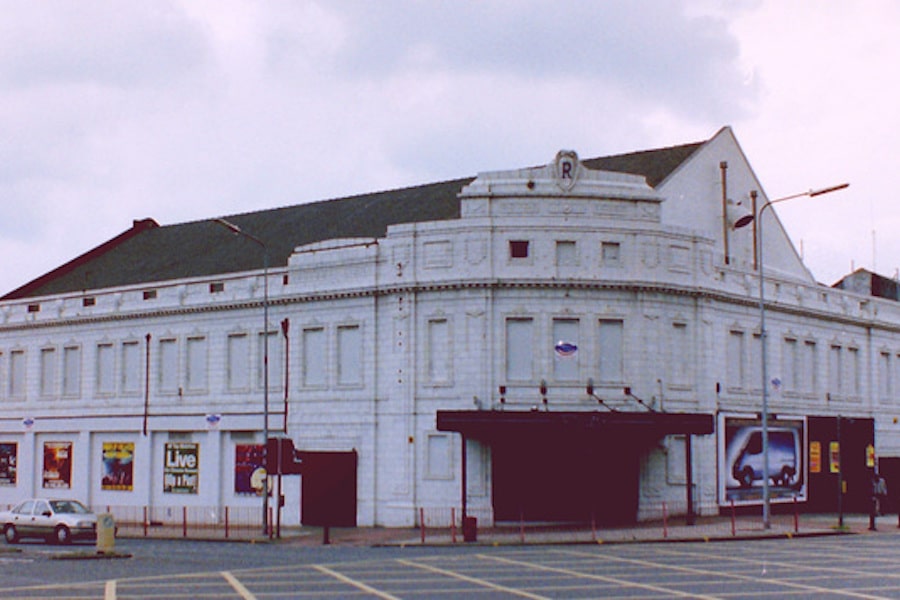
By the late 1990s, the Rialto was in a state of disrepair, and plans to restore it as a nightclub were abandoned.
On a cold night in 2000, the iconic building was destroyed in a mysterious fire, leaving only memories of its illustrious past.
Yet, the Rialto continues to live on in the hearts and minds of Salfordians.
Gary Williams, who runs the popular Salford Yester Years Facebook group, has made it his mission to keep its memory alive.
His own connection to the Rialto is unique—he was born in its foyer in 1965 while his mother was watching a film.
Today, he restores old photos of the building, ensuring that its legacy is not forgotten.
You can check out the facebook group by clicking here
The Rialto’s name even lives on through Salford Roasters, a local coffee company that named one of its blends after the historic site.
From a grand cinema to a nightclub complex, a snooker hall to a rehearsal space, the Rialto was more than just a building; it was a symbol of Salford’s cultural evolution.
Over the decades, it served as a playground for the city’s youth, a stage for its musicians, and a gathering place for some of its most famous and infamous characters.
Today, even in its absence, the Rialto remains an indelible part of Salford’s heritage—a place that was, for many, the heart of the city.
- This article was last updated 5 months ago.
- It was first published on 23 October 2024 and is subject to be updated from time to time. Please refresh or return to see the latest version.
Did we miss something? Let us know: press@ilovemanchester.com
Want to be the first to receive all the latest news stories, what’s on and events from the heart of Manchester? Sign up here.
Manchester is a successful city, but many people suffer. I Love Manchester helps raise awareness and funds to help improve the lives and prospects of people across Greater Manchester – and we can’t do it without your help. So please support us with what you can so we can continue to spread the love. Thank you in advance!
An email you’ll love. Subscribe to our newsletter to get the latest news stories delivered direct to your inbox.
Got a story worth sharing?
What’s the story? We are all ears when it comes to positive news and inspiring stories. You can send story ideas to press@ilovemanchester.com
While we can’t guarantee to publish everything, we will always consider any enquiry or idea that promotes:
- Independent new openings
- Human interest
- Not-for-profit organisations
- Community Interest Companies (CiCs) and projects
- Charities and charitable initiatives
- Affordability and offers saving people over 20%
For anything else, don’t hesitate to get in touch with us about advertorials (from £350+VAT) and advertising opportunities: advertise@ilovemanchester.com
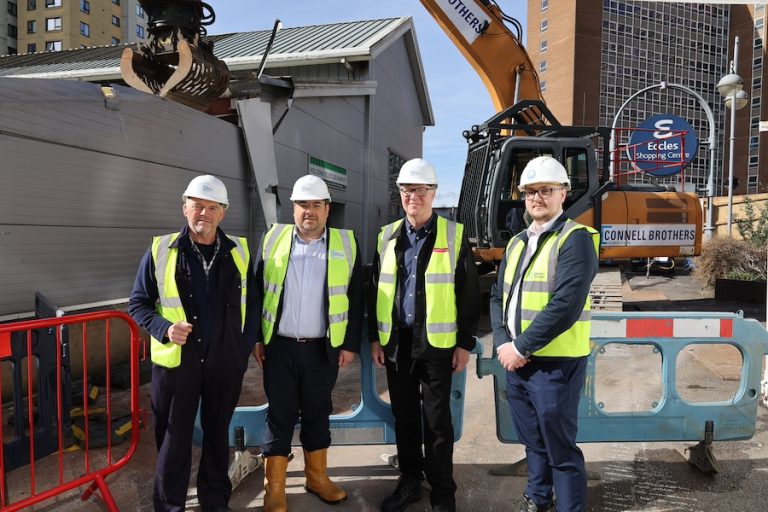
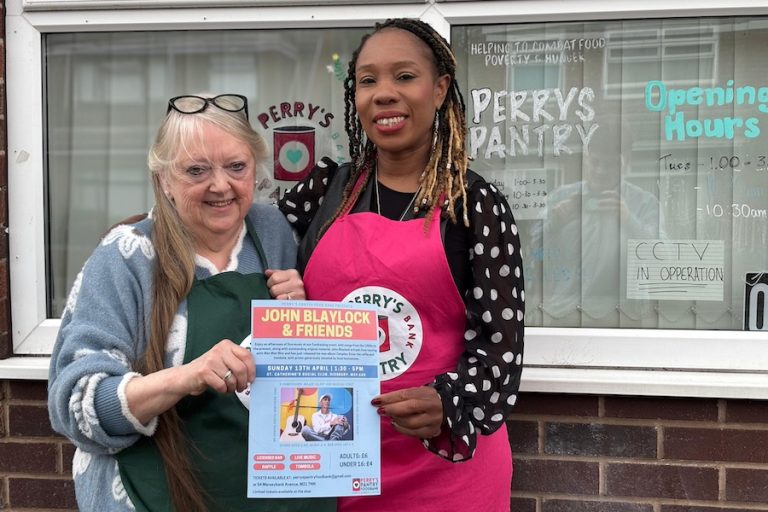
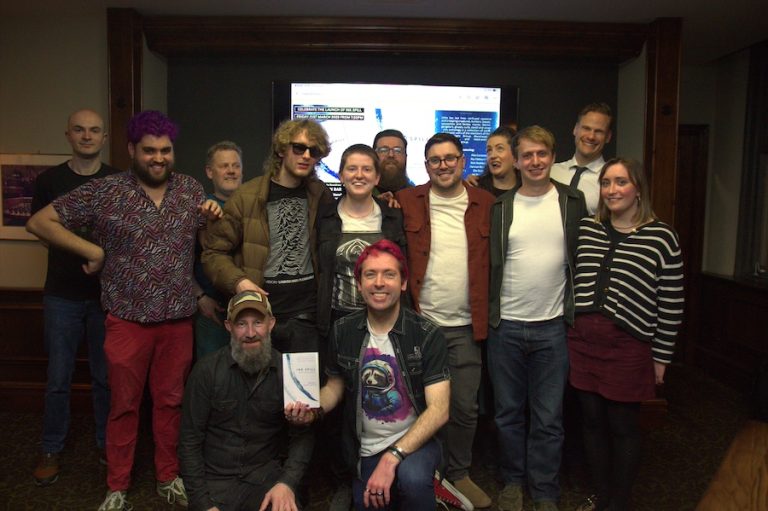
The eclectic group that’s been helping writers cut their teeth for 50 years

Manchester and Los Angeles prove that opposites really do attract

“His presence will be deeply missed” Children’s hospice bids farewell to their visionary CEO







